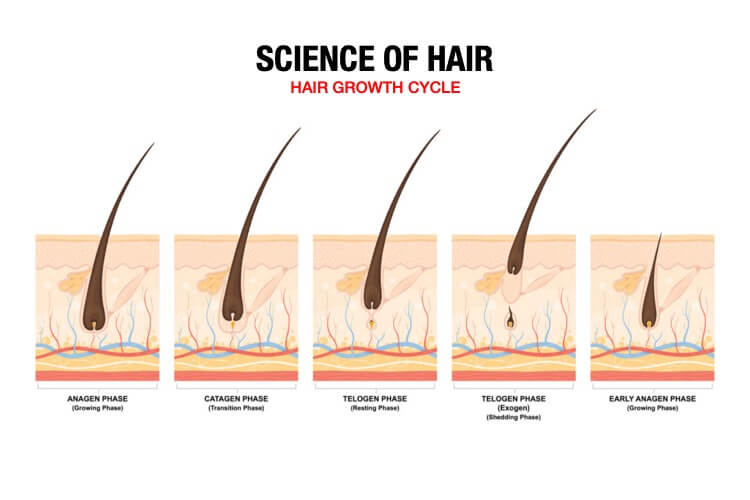"Unlock the Secrets to Luscious Locks: A Comprehensive Guide to Healthy Hair Growth"
Understanding the Four Stages of Hair Growth and How to Promote Healthy Hair
Introduction
Hair is not just a fashion statement but also a symbol of good health and vitality. Many people aspire to have strong, healthy hair, but the process of hair growth is more complex than it might seem. The hair growth cycle consists of four distinct phases: anagen, catagen, telogen, and exogen. These phases have been extensively studied to gain a better understanding of how hair grows and what can be done to prevent or treat hair loss. In this comprehensive guide, we will delve into each stage of hair growth and explore ways to maintain healthy hair throughout the entire cycle.

Stage 1: Anagen - The Growing Phase
The anagen phase marks the beginning of the hair growth cycle. It is the longest of the four stages and can last between 3 to 7 years. However, the duration of the anagen phase can vary depending on the location of the hair on the body. For instance, eyebrow and pubic hairs have a shorter anagen phase compared to scalp hairs.
During this phase, hair follicles are actively producing and pushing out hair strands. These hairs will continue to grow until they are either cut or reach the end of their lifespan and naturally fall out. At any given time, approximately 90 percent of the hairs on your scalp are in the anagen phase.
References:
- Cellular and Molecular Events in Hair Follicle Development and Cycling - Joseph R. La Marca, et al. (Journal of Cell Science) Link
- Hair Follicles: An Overview of the Hair Growth Cycle - Subham Das, et al. (PubMed Central) Link
Stage 2: Catagen - The Transition Phase
The catagen phase follows the anagen phase and typically lasts for about 10 days. During this period, hair follicles shrink, and hair growth slows down. Hair strands also separate from the bottom of the follicle while remaining in place during the final days of their growth.
It's important to note that only about 5 percent of the hairs on your head are in the catagen phase at any given time. This is the stage where hair prepares to enter the next phase, the telogen phase.
Stage 3: Telogen - The Resting Phase
The telogen phase is a resting phase for the hair and usually lasts around 3 months. Approximately 10 to 15 percent of your scalp hairs are in this phase at any given time. During the telogen phase, hair neither grows nor falls out; it simply remains in place.
This phase is also the time when new hairs begin to form in follicles that have recently released hairs during the catagen phase. Some experts consider the telogen phase as the shedding phase, but it is often divided into two parts: the telogen and exogen stages.
References:
- Hair Loss: Types, Causes, and Treatments - NYU Langone Health Link
Stage 4: Exogen - The Shedding Phase
The exogen phase is an extension of the telogen stage of hair growth. During this phase, hair is shed from the scalp, often aided by activities like washing and brushing. It is considered normal to lose 50 to 100 hairs per day during the exogen phase.
While old hairs are falling away, new hairs are growing in the follicles, preparing to replace them. The exogen phase typically lasts for about 2 to 5 months.
How to Maintain Hair Health During All Four Stages
Maintaining healthy hair during all four stages of the hair growth cycle is essential for achieving the luscious and vibrant hair you desire. While genetics and hormones play a significant role in the health of your hair, there are several factors that you can control to promote optimal hair growth and overall hair health.
1. Good Nutrition
Hair is primarily composed of protein, so it's crucial to maintain an adequate protein intake. Including lean meats, fish, beans, legumes, and low-fat dairy products in your diet can provide the necessary protein for healthy hair growth. In addition to protein, several nutrients are associated with promoting healthy hair growth, such as Vitamin D, Vitamin C, Iron (especially in women), Zinc, folic acid, and Vitamin B12.
References:
- Nutrition and Hair Health - Rajani Katta and Samir P. Desai (PubMed Central) Link
2. Reduced Stress
High stress levels can contribute to premature hair loss. There are three specific conditions related to stress and hair loss, including Telogen effluvium, Trichotillomania, and Alopecia areata. These conditions can accelerate the hair growth cycle and lead to increased hair loss.
Managing stress through techniques like yoga, meditation, deep breathing exercises, counseling, and reducing daily stressors in your life can have a positive impact on your hair health.
3. Proper Hair Care
Proper hair care is vital for maintaining healthy hair. Start with selecting the right shampoo and conditioner for your hair type, whether it's oily, dry, fine, or color-treated. Experiment with different products to find what works best for your hair.
Gentle hair care is equally important. Avoid using very hot water when shampooing and be gentle when towel-drying your hair. Wet hair is more susceptible to damage, so handle it with care. Reducing the heat when blow-drying your hair can also minimize potential damage.
Key Takeaways
Understanding the four stages of hair growth—anagen, catagen, telogen, and exogen—is essential for maintaining healthy hair. While genetics and hormones are beyond our control, adopting a healthy lifestyle, managing stress, and practicing proper hair care can promote healthy hair growth throughout the entire cycle.
If you notice that you're losing hair at an unusually rapid rate, it's essential to consult with a medical professional. Underlying conditions that disrupt the natural stages of hair growth may be responsible, and addressing them promptly can help slow hair loss and preserve the health of your existing hair.
References:
- Cellular and Molecular Events in Hair Follicle Development and Cycling - Joseph R. La Marca, et al. (Journal of Cell Science) Link
- Hair Follicles: An Overview of the Hair Growth Cycle - Subham Das, et al. (PubMed Central) Link
- Hair Loss: Types, Causes, and Treatments - NYU Langone Health Link
- Nutrition and Hair Health - Rajani Katta and Samir P. Desai (PubMed Central) Link
Conclusion
Understanding the four stages of hair growth is crucial for anyone looking to maintain healthy, beautiful hair. By adopting a balanced diet, managing stress, and practicing proper hair care, you can promote healthy hair growth throughout the hair growth cycle. While genetics and hormones play a significant role in hair health, the steps you take to care for your hair during each stage can make a substantial difference. If you're concerned about excessive hair loss, consult with a healthcare professional to address any underlying issues and ensure your hair remains healthy and vibrant.
A sample diet plan that includes foods rich in essential nutrients for healthy hair:
Breakfast:
- Scrambled Eggs: Eggs are an excellent source of protein, biotin, and B vitamins, which are essential for healthy hair.
- Whole-Grain Toast: Whole grains provide complex carbohydrates and fiber, promoting overall health, which indirectly supports hair growth.
- Berries: Blueberries or strawberries are rich in antioxidants that protect hair follicles from damage.
Mid-Morning Snack:
- Greek Yogurt: Greek yogurt is high in protein and also contains vitamin B5 (pantothenic acid) that can help promote hair health.
- Almonds: Almonds are a great source of biotin and vitamin E, which nourish the scalp and promote healthy hair.
Lunch:
- Salmon: Salmon is rich in omega-3 fatty acids, which are essential for scalp health and hair growth.
- Spinach Salad: Leafy greens like spinach are packed with iron, folate, and vitamins A and C that support healthy hair.
- Quinoa: A high-protein, whole grain that provides essential amino acids.
Afternoon Snack:
- Carrots: Carrots are a good source of vitamin A, which promotes a healthy scalp.
- Hummus: Chickpeas in hummus provide protein and biotin for hair growth.
Dinner:
- Lean Chicken or Tofu: Lean protein sources are essential for hair health.
- Brown Rice: Brown rice is a complex carbohydrate that provides energy and supports overall health.
- Broccoli: Rich in vitamins C and A, and contains sulforaphane, which may promote hair growth.
Evening Snack:
- Cottage Cheese: Cottage cheese is a source of protein and calcium that helps with hair strength.
- Flaxseeds: Flaxseeds provide omega-3 fatty acids and fiber.
Hydration:
- Water: Staying well-hydrated is essential for maintaining hair health. Drink plenty of water throughout the day.
Additional Tips:
- Stay Hydrated: Drinking enough water is crucial for maintaining hair moisture.
- Limit Sugar and Processed Foods: Excess sugar can lead to inflammation, which can negatively affect hair growth.
- Include Healthy Fats: Incorporate sources of healthy fats like avocados, nuts, and seeds, which support scalp health.
- Variety is Key: A well-rounded diet that includes a variety of nutrients is essential for healthy hair growth.
- Supplements: If you have specific deficiencies, consider talking to a healthcare professional about supplements like biotin or iron, but consult a healthcare provider before taking any new supplements.
Disclaimer:
The information provided in this blog is intended for general informational and educational purposes only. It should not be considered as professional medical or dietary advice. While we strive to offer accurate and up-to-date content, it is essential to consult with a healthcare professional or a registered dietitian for personalized guidance on specific health and dietary concerns. Any reliance on the information provided in this blog is at your own risk, and we do not assume any responsibility for the outcomes of following the recommendations presented. Always consult with a qualified expert before making significant changes to your diet or health practices.








